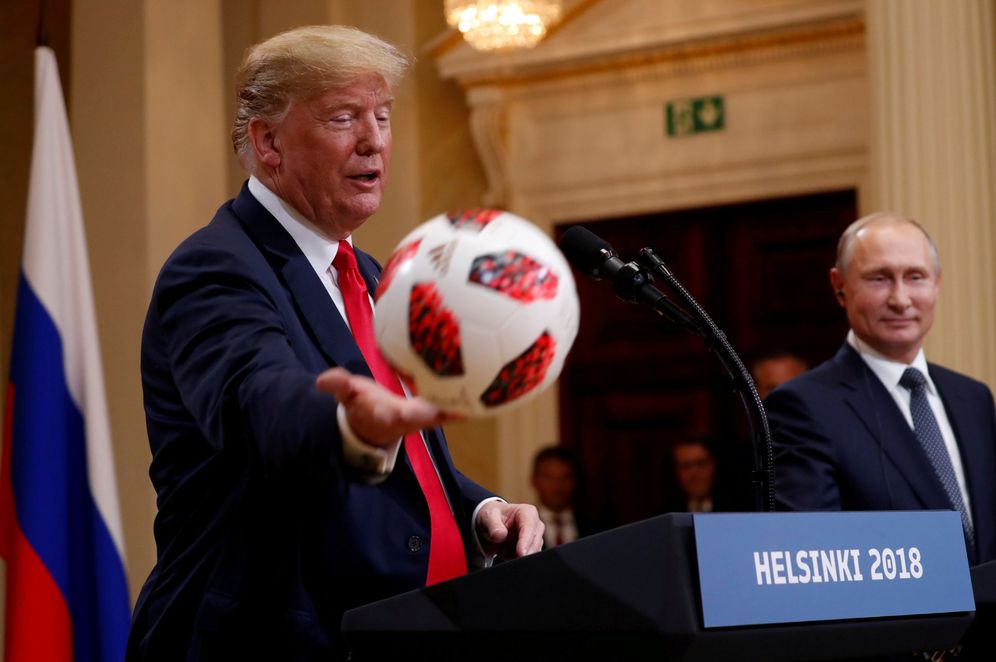
The U.S. president seems determined to constantly praise a rival who has attempted to undermine his country in different ways. It is as if the head and the body of the country were independent from each other.
Donald Trump should “check the soccer ball” that Vladimir Putin gave him during their meeting in Helsinki “for listening devices,” said Republican Sen. Lindsey Graham last Monday. It’s a vivid way of summarizing the taste that the first bilateral summit between both leaders left in Washington. A seemingly agreeable meeting filled with good intentions; like an attempt to turn the page after a bad relationship, but surrounded by obscure suspicions.
The meeting could also be summarized in one gesture: Trump’s quick wink to Putin the moment he sat down in front of the press in Helsinki. A wink that could mean either absolutely nothing or everything: here we have a man, President Trump, who’s determined to constantly praise a rival who has attempted to undermine his country in different ways. It’s as if the U.S. head (Trump) wasn’t linked to the body (Congress, the majority of members of both parties, and the intelligence agencies).
The summit confirmed this paradox. While the special investigation which Robert Mueller has undertaken into presumed Russian influence on the 2016 presidential election continues to gather evidence and suspects, including 12 Russians connected to the Kremlin’s military intelligence agency and five people connected to Trump’s campaign, the U.S. president says he sees “no reason” to suspect Russia might have had any influence over the election. And he acknowledged that he believed President Putin, since, during the meeting, Putin “was extremely strong and powerful in his denial” about Moscow having anything to do with it. In a moment of candor, the Russian president directly acknowledged that Trump had been his favorite candidate in the election.
Washington political forces from left to right, were incredulous. “I never thought I would see the day when our American president would stand on the stage with the Russian president and place blame on the United States for Russian aggression. This is shameful,” tweeted Republican senator and Trump critic, Jeff Flake, of Arizona.
A few hours prior to the meeting, the American president blamed his predecessors in the Oval Office for harming the relationship with Moscow. “Our relationship with Russia has NEVER been worse thanks to many years of U.S. foolishness and stupidity,” Trump tweeted, also branding Mueller’s investigation a “Rigged Witch Hunt.” Trump didn’t mention the fact that the investigation has evidence showing that documents from the Democratic Party were stolen by the Kremlin. Nor did Trump say anything about Russia’s support of Bashar Assad in the Syrian war or the annexation of Crimea in 2014, which prompted the first series of American sanctions on Russia.
The CIA’s former director, John Brennan, went further and accused Trump of betrayal. “Donald Trump’s press conference performance in Helsinki rises to & exceeds the threshold of ‘high crimes & misdemeanors.’ It was nothing short of treasonous,” he said. “Not only were Trump’s comments imbecilic, he is wholly in the pocket of Putin. Republican Patriots: where are you???”
The Suspicions of ‘Kompromat’ Re-emerge
The Democrats charged into action. “Just several days ago, 12 Russians were indicted for attacking our democracy,” tweeted Rep. Nancy Pelosi, a progressive leader in the House of Representatives. “Today, America’s so-called leader embarrassingly failed to stand up to the person who spearheaded the attack. Seriously, what does Putin have on Trump that’s making him so afraid?”
According to the opposition’s theory, Russia possesses compromising information (“kompromat,” in the post-Soviet jargon) about the U.S. president. This could be the reason why he refuses to put pressure on Russia’s president or even contradict him, despite the evidence that Putin interfered, the opinion of all the U.S. intelligence agencies, and a long tradition of rivalry with the Kremlin that has led to conflicts all across the world.
The seemingly good relationship between both leaders contrasted with Trump’s attitude regarding NATO and EU allies during his tour of Europe last week. A day before the summit with Putin, a journalist asked him who America’s enemies were. Instead of naming China or Russia, Trump’s first answer was, “the European Union.” “In a trade sense, they’ve really taken advantage of us,” he explained.
The two presidents agreed that they expected that a new period of bilateral cooperation could take place. “Our relationship has never been worse than it is now,” Trump claimed during the press conference. “However, that changed as of about four hours ago … Today’s meeting is only the beginning of a longer process.” Their good intentions didn’t reflect any concrete policy regarding any of the numerous fronts on which both countries tend to clash: the Syrian and Ukrainian wars, the deal with Iran, or the recent poisoning of Russian citizens in the U.K. Prior to the meeting, Trump had expressed his hope that they would find a way to reduce nuclear arsenals.
Putin, a former KGB expert on psychological manipulation, followed his usual script: he had Trump wait for more than an hour. According to sources from CNBC, the two-hour meeting behind closed doors, with only the interpreters, raised concerns among Trump’s advisers, since the American president’s political experience is only a fraction of that of the man who’s led Russia for more than two decades. In addition, The New York Times claims that Trump refused to prepare for this summit.
While the U.S. head was shaking Putin’s hand, the U.S. body protested. “There is no question that Russia interfered in our election and continues attempts to undermine democracy here and around the world,” said House Speaker Paul Ryan. “The president must appreciate that Russia is not our ally. There is no moral equivalence between the United States and Russia, which remains hostile to our most basic values and ideals.” Moscow and Washington – especially the latter – are now stepping into unknown territory.

Leave a Reply
You must be logged in to post a comment.